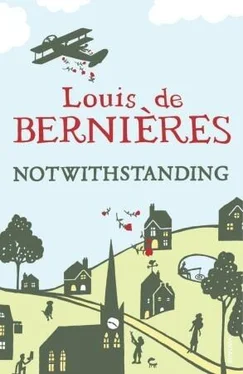Louis de Bernieres - Notwithstanding - Stories from an English Village
Здесь есть возможность читать онлайн «Louis de Bernieres - Notwithstanding - Stories from an English Village» весь текст электронной книги совершенно бесплатно (целиком полную версию без сокращений). В некоторых случаях можно слушать аудио, скачать через торрент в формате fb2 и присутствует краткое содержание. Год выпуска: 2010, Издательство: Vintage, Жанр: Современная проза, на английском языке. Описание произведения, (предисловие) а так же отзывы посетителей доступны на портале библиотеки ЛибКат.
- Название:Notwithstanding: Stories from an English Village
- Автор:
- Издательство:Vintage
- Жанр:
- Год:2010
- ISBN:нет данных
- Рейтинг книги:4 / 5. Голосов: 1
-
Избранное:Добавить в избранное
- Отзывы:
-
Ваша оценка:
- 80
- 1
- 2
- 3
- 4
- 5
Notwithstanding: Stories from an English Village: краткое содержание, описание и аннотация
Предлагаем к чтению аннотацию, описание, краткое содержание или предисловие (зависит от того, что написал сам автор книги «Notwithstanding: Stories from an English Village»). Если вы не нашли необходимую информацию о книге — напишите в комментариях, мы постараемся отыскать её.
is a funny and moving depiction of a charming vanished England.
Notwithstanding: Stories from an English Village — читать онлайн бесплатно полную книгу (весь текст) целиком
Ниже представлен текст книги, разбитый по страницам. Система сохранения места последней прочитанной страницы, позволяет с удобством читать онлайн бесплатно книгу «Notwithstanding: Stories from an English Village», без необходимости каждый раз заново искать на чём Вы остановились. Поставьте закладку, и сможете в любой момент перейти на страницу, на которой закончили чтение.
Интервал:
Закладка:
‘Robert?’ repeated Mac.
‘Robert,’ said Mrs Mac, ‘with sandy hair, blue eyes and one of those sheepskin flying jackets. He says he wants you to know that he’s all right. Then he said “Toodle-oo” and disappeared.’
Mac sat up in bed and looked at her, his mouth hanging open, and a cold shiver travelling the length of his spine. ‘I knew a Robert,’ he said, ‘and he always used to say “Toodle-oo”. Got burned in a Bristol Fighter.’
‘He’s dead, then, is he?’ asked Mrs Mac, realising all at once the significance of her dream, and Mac nodded. He was recalling the best friend of his youth, who had managed to become an officer, and campaigned so vigorously to be seconded from his regiment into the Royal Flying Corps, only to be killed accidentally, three weeks after winning his wings, on the second-to-last day of the war.
In the aftermath of that war these islands were in tears, and never before had there come about such a rending of the veil between this world and the next. Mediums sprung up like cuckoo pint in the spring, among them the fraudulent, the genuinely gifted, the innocent but deluded, the disingenuous, and those who could be both spectacularly right and wrong within the space of a single sentence.
Mrs Mac sought neither money nor notoriety, but gathered around her a small group of people from all walks of life, who crammed themselves into the tiny room, sat holding hands around the wooden table, and received messages from those they had loved, as well as some from complete strangers, as if the dead were as promiscuous as the living in their need to speak across the abyss, and as desperate for reassurance.
Mrs Mac began her meetings with a short prayer, calling upon the Lord to bless their undertaking, and to protect those gathered together from the mischief of the uncouth spirits that inhabited the lower ether, and then the lights were quenched, with the exception of a single candle in the middle of the table, upon whose flame Mrs Mac would focus until her vision blurred and the dead would appear before her inner eyes, queuing up behind each other as it well behoved the British dead.
As the decades passed, Mrs Mac’s circle of spiritualists passed on, one by one, until those who had once sat expectantly in the chairs became the very visitors who stepped out of the candle’s yellow flame to bring their cryptic messages and declarations from the other side. Increasingly, Mrs Mac dwelt not in this corporeal sphere, but in the next, until the two elided and coincided, and any distinction between them became redundant. It was as if Mrs Mac had died while remaining alive, or as if she had taken to living among the dead. She subsisted without terror, fearing only the pain and inconvenience of transferring from one condition to another when her own moment of death arrived, and looking forward to the better state of health whose enjoyment she envisaged on the far shore. Many in the village considered her mad, or at least half-baked, but she was sweet-natured, kindly and fascinating, and therefore those who did not believe in her phantoms simply humoured her. ‘She’s harmless,’ people would say, shrugging their shoulders, ‘and, you never know, there might be something in it.’
One day Joan called in on Mrs Mac, saying, ‘I’m just going up to the church to do the flowers, and I wondered if you’d like to come.’ Joan took village responsibilities seriously and ran a kind of localised social services organisation that was entirely of her own devising. She was a devout conservative, perceiving that if all the world were made up of communities such as this one, and if every such community had people like herself and her friends to help anyone at any time, then there would be no conceivable need for socialism. The trouble with socialism, thought Joan, was either that it told you to do what you were going to do anyway, and therefore made you not want to do it, or else it took things out of your hands and did them worse than you would have done, but at far greater expense.
Joan was an implacable Utopian, envisaging a world where individuals were responsible, rather than the state, and it was she and her husband, the Major, who would one day start a revolution whose aim was independence from Waverley Borough Council.
Mrs Mac and Mrs Mac’s sister considered Joan’s offer; they had many old friends and relations to visit in the graveyard. ‘I’ll just go in and ask Mac,’ said Mrs Mac, and in she went, to see what her husband thought. ‘Mac, dear,’ she asked him, ‘Joan’s offered to take us up to the churchyard. Would you like to come?’
It was often hard for Mrs Mac to get Mac to pay attention; he seemed to exist for much of the time in a state of profound contemplation, his head bowed, and his hands folded in his lap; extreme age had reduced him to the semblance of a philosopher. Mrs Mac repeated her question more loudly, and Mac raised his hoary head slowly. Their eyes met, and Mac’s mouth twitched at the corners into the slightest of smiles. He nodded. Mrs Mac went back outside and told Joan, ‘Mac says that he’d like to come. I do hope that that’s all right. Of course, if it’s any trouble …’
Joan had been prepared for this; Mrs Mac was notorious for consulting Mac about every single thing, always running back and forth from the garden gate to the house, and more often than not she took him with her, talking to him continuously and very loudly in public, so that people who did not know her looked at her askance, and giggled to each other. Mrs Mac was growing deaf, and did not realise just how public her monologue was.
Mrs Mac went back indoors to fetch Mac and re-emerged with one arm akimbo, so that Mac could thread his own arm through, for support. ‘Good morning, Mac,’ said Joan, who was used to their ways, and Mrs Mac said, ‘Mac says “Good morning”, don’t you, Mac?’ She turned to her sister and said, ‘Let’s put Mac in the middle. Then we can share him. Doesn’t know his luck, does he?’
Mrs Mac had to cope with Mac’s usual disorientation, and spent some time coaxing him into the back of Joan’s Rover. Joan patted the gatepost cat on the head, being rewarded with the usual impartial hiss, and then she picked holly from the hedge by the bank, so that she could give it to Mrs Mac and her sister, for their loved ones’ graves. She already had variegated holly and ivy from her own garden in the boot of the car, but was determined that they should go in a vase beneath the window to St Peter, whose church it was. She had the reputation of a flower arranger sans pareil , and her husband, the Major, had often remarked that if she had chosen an art form less ephemeral, she might easily have become quite as famous as Picasso, but with considerably more justice. Joan was immodestly proud of her facility with sprigs and flowers, and rightly so.
Joan drove carefully past the convent at the apex of the hill, because the nuns had a habit of emerging from their driveway at full tilt, without looking to right or left, and then she drove just as carefully through the central cluster of the village. Here the road was only a few feet wide, very sinuous, and just as likely to be carrying upon it a carload of jeopardous brides of Christ. Equally one might be run upon by Miss Agatha Feakes in her antique car, often with a piebald goat on the back seat, her white hair flying as she pumped the horn in lieu of using her brakes. They passed the hedging and ditching man, who, amid the steam of his own breath, was contemplating the skull of a fox that he had just found in the ditch. ‘Alas, poor Foxick,’ jested Joan, aware that her pleasantry would probably be lost on the Macs. She drove through the arches of oak trees that spanned the lane. In summer they gave drivers the sensation of entering a tunnel in Arcadia, but now only a few tenacious brown leaves rustled on those great boughs that seemed to be upheld in beseechment to a white, implacable sky. Finally Joan turned right, up the very steep hill to St Peter’s Church. Since the church was Anglican, this road customarily had no nuns upon it, and so Joan speeded up a little in order to gain some momentum for the ascent, sounding her horn at the two most dangerous corners. ‘Nearly there,’ said Mrs Mac to her husband, and Mrs Mac’s sister echoed, ‘Yes, nearly there.’
Читать дальшеИнтервал:
Закладка:
Похожие книги на «Notwithstanding: Stories from an English Village»
Представляем Вашему вниманию похожие книги на «Notwithstanding: Stories from an English Village» списком для выбора. Мы отобрали схожую по названию и смыслу литературу в надежде предоставить читателям больше вариантов отыскать новые, интересные, ещё непрочитанные произведения.
Обсуждение, отзывы о книге «Notwithstanding: Stories from an English Village» и просто собственные мнения читателей. Оставьте ваши комментарии, напишите, что Вы думаете о произведении, его смысле или главных героях. Укажите что конкретно понравилось, а что нет, и почему Вы так считаете.












